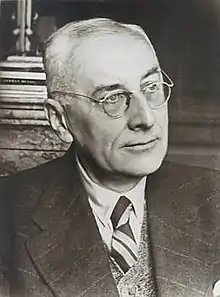Nicolaas Wilhelmus Posthumus
Nicolaas Wilhelmus Posthumus or N.W. Posthumus (26 February 1880 in Amsterdam – 18 April 1960 in Bussum) was a Dutch economic historian, political scientist, and professor at Erasmus University Rotterdam.
Nicolaas Wilhelmus Posthumus | |
|---|---|
 N. W. Posthumus | |
| Born | 26 February 1880 |
| Died | 18 April 1960 (aged 80) |
| Nationality | Dutch |
| Academic career | |
| Field | Economic History |
| Righteous Among the Nations |
|---|
 |
| By country |
Posthumus was one of the founders of both the International Institute of Social History in Amsterdam and the Faculty of Political and Social Sciences at the University of Amsterdam.
Biography
Posthumus was born as the son of geography teacher Nicolaas Wilhelmus Posthumus and Huibertje IJzerman. He graduated high school and began studying at the University of Amsterdam in 1898. From March to October 1901, he was editor of the satirical student magazine Propria Cures. In 1908 he graduated with a Doctorate of Public Sciences, writing his dissertation on the "History of the Leidsche sheet industry".
After graduation, Posthumus studied a few years of economics and trade law at the municipal trade school in Amsterdam. In 1913, he became a professor of economic history at the Netherlands School of Commerce in Rotterdam. In 1915, he founded and published the Economisch-Historisch Jaarboek—a yearly collection of primary source documents and empirical analysis of Dutch merchant records.[1] In 1918-1919 he succeeded Gijsbert Weijer Jan Bruins as Rector Magnificus of the university. In 1922 he was appointed as a lecturer at the Faculty of Arts and Philosophy in Amsterdam, and in 1932 he founded the Economic Historical Library.
Following the rise of the Nazi party in Germany, Posthumus founded the International Institute of Social History in 1935 as a place to retain socialist documents and histories safe from the Nazi regime and other governments which might exert control over them.[2] When Germany invaded the Netherlands the activities of the institute were disrupted. He was dismissed in 1942 by the government of the occupied Netherlands and returned to his post only following the war. During the war he managed to publish Inquiry into the History of Prices in Holland. Vol. i, an exhaustive empirical study of market prices and rates of exchange in Amsterdam from the 16th century until the First World War, made within the International scientific committee on price history.[3][4] The work was favorably received and remains his most widely cited to date.[5]
After the war he wrote a history of the German occupation of the Netherlands entitled The Netherlands During German Occupation.[6] He worked with various institutes, including the Dutch Institute for War Documentation and held a full professorship in Economic and Social Sciences at the University of Amsterdam until 1949, when he resigned to head the Brill publishing house.[1] The N.W. Posthumus Instituut, a graduate research facility in economics at the University of Groningen, was founded in 1988[7] in his honor.[8]
In 1929 Posthumus became member of the Royal Netherlands Academy of Arts and Sciences, he was forced to resign in 1942. In 1945 he was readmitted as member.[9] From 1946 to 1958, Posthumus was Director of scientific publisher Brill. From 1 January 1949 to his death, Posthumus was chairman of the Dutch Economic Historical Archive, which he founded in 1913.
On 20 July 1908 Posthumus married Marcel Dorothea van Loon, with whom he a daughter and a son. He divorced her in 1928. On 7 January 1931 Posthumus married his second wife Willemijn van der Goot, a feminist and the first Dutch woman to earn a doctorate in economics. They had one child, Claire, in Amsterdam in 1938, shortly before moving to Noordwijk aan Zee and later Leiden for the duration of World War II.[10]
During the war, he and his family helped relocate Jewish children from Amsterdam to foster families. He and Willy cared for a child, Bertha Eveline Koster, in their own home from 1943 to 1945. Posthumus, Van der Goot, and sister-in-law Diaz-van der Goot received the "Righteous Among the Nations" recognition.[11] Posthumus and Van der Goot separated in 1950.
Notes
- "N.W. Posthumus". About the Institute. International Institute of Social History. Retrieved 2008-08-18.
- "International Institute of Social History:Some notes about IISH's history". Features about selective archives and their Trotskyana collections. TrotskyanaNet. Retrieved 2008-08-18.
- Julien Demade, Produire un fait scientifique. Beveridge et le Comité international d'histoire des prix, Paris, Publications de la Sorbonne, 2018, p. 39. ISBN 979-10-351-0058-2.
- Clark, G. N. (July 1948). "Reviewed work(s): Inquiry into the History of Prices in Holland. Vol. i, Wholesale Prices at the Exchange of Amsterdam, 1585–1914, Rates of Exchange at Amsterdam, 1609–1914 by N. W. Posthumus". The English Historical Review. Oxford: Oxford University Press. 63 (248): 379–381. doi:10.1093/ehr/LXIII.CCXLVIII.379. ISSN 0013-8266. JSTOR 555355.
- Hamilton, Earl J. (May 1946). "Reviewed work(s): Nederlandsche Prijsgeschiedenis, Deel I: Goederenprijzen of de Beurs van Amsterdam, 1585–1914; Wisselkoersen te Amsterdam, 1609–1914. by N. W. Posthumus". The Journal of Economic History. Cambridge University Press. 6 (1): 73–79. doi:10.1017/S0022050700062124. ISSN 0022-0507. JSTOR 2112997.
- Feldman, Herman (1946). "Review: The Netherlands during German Occupation". Annals of the American Academy of Political and Social Science. American Academy of Political & Social Science. 245 (1): 214. doi:10.1177/000271624624500163. ISSN 0002-7162. OCLC 50544474. S2CID 144901896.
- "Annual Report 2005 N.W. Posthumus Instituut" (PDF). N.W. Posthumus Instituut (NWP). 2005. p. 7. Retrieved 2008-08-20.
- "Mission and Goals". N.W. Posthumus Instituut. University of Groningen. February 13, 2008. Archived from the original on October 5, 2008. Retrieved 2008-08-18.
- "Nicolaas Wilhelmus Posthumus (1880 - 1960)". Royal Netherlands Academy of Arts and Sciences. Retrieved 30 July 2015.
- Bosch, Mineke (13 November 2015). "Goot, Willemijn Hendrika van der (1897-1989)". Huygens ING (in Dutch). The Hague, The Netherlands: Huygens Institute for the History of the Netherlands. Archived from the original on 2 July 2017. Retrieved 1 August 2017.
- "Posthumus Family". Yad Vashem. Jerusalem Israel: The Holocaust Martyrs' and Heroes' Remembrance Authority. 2008. Retrieved 2 August 2017.